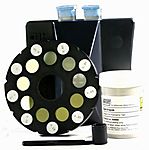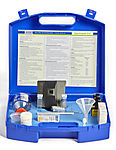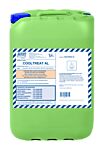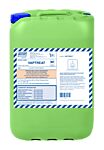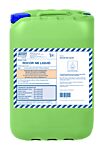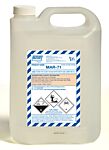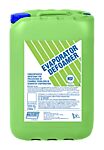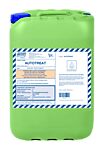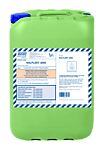


Last updated: 23/10/2024 01:00:33
OXYGEN CONTROL 25 LTR
Product Code
- Product group:
- 655
- Product number:
- 571315
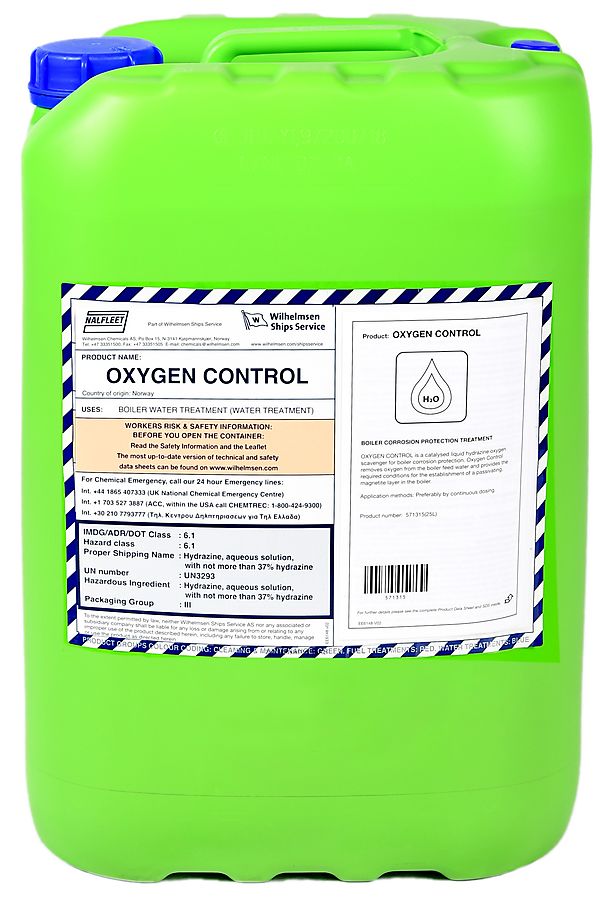
NALFLEET™ Oxygen Control™ is a catalysed liquid hydrazine oxygen scavenger for boiler corrosion protection and treatment. NALFLEET™ Oxygen Control™ provides the required conditions for the establishment of a passivating layer (magnetite) in the boiler.

Product information
This product supersedes product no: 777705
Features
- NALFLEET™ Oxygen Control is a liquid product, easy to feed
- Does not contribute to conductivity
- Protects boiler, steam lines, condensate lines and feed water lines from corrosion
- Fast action due to catalyst
- Assists mechanical deaeration
- Simple test to determine level of treatment
- NALFLEET™ Oxygen control can be used to condition the water used for laying up the boiler in a wet condition.
Benefits
- Economical in use
- Reduces corrosion of iron and copper, increasing system life and reliability
- Passivates metal in the boiler
Specification
General
| Invent Hazard Material (IMO/EU) classification | C-9 |
|---|
Physical properties
| Appearance | Colourless |
|---|---|
| Density [g/ml] | 1.0 |
| Form | Liquid |
| pH | 12 |
Technical data
| Not Compatible | Avoid copper, brass and aluminium. |
|---|
Safety Data Sheet (SDS)
Documents
Directions for use
NALFLEET™ Oxygen Control can be used in all boiler systems, from low to high pressures and in conjunction with mechanical de-aeration systems. The treatment combines with dissolved oxygen to form water and inert nitrogen gas, thus effectively removing O2 from the water. No solid materials are produced, so there is no contribution to the increase in total dissolved solids -a critical factor in high pressure boilers. The removal of dissolved oxygen is vital for preventing oxygen pitting and corrosion in boilers. NALFLEET™ Oxygen Control reacts with ferrous and non-ferrous oxides to prevent general corrosion.Ferric oxide (red rust, Fe2O3) is converted to magnetite (black iron oxide, Fe3O4), which is a tough corrosion resistant oxide which protects the metal surface. The term for this is 'passivating' the surfaces, so that they are protected from further corrosion.
Dosing method
For optimum protection, NALFLEET™ Oxygen Control should be fed continuously into the boiler feed line, after the feed pump recirculating valve, using an automatic dosing systems. For steam turbine systems, NALFLEET™ Oxygen Control can be dosed into the cross over between the H.P. and L.P. turbines or the storage section of the deaerator for full protection.
Dosage and control
The objective is to maintain a hydrazine residual between 0.05-1.0 ppm depending on operating pressure and boiler design. Actual consumption is determined under operating conditions.
HYDRAZINE TEST RESULT ppm |
|||||||
Boiler Pressure |
Control Range |
0-0.05ppm |
0.05-0.10 |
0.10-0-.50 |
0.50-1.00 |
1.00-1.50 |
|
<18 to 31 bar |
0.1-1.0ppm |
Increase dose 25% |
Increase dose 25% |
Satisfactory Maintain dose |
Satisfactory Maintain dose |
Decrease dose 25% |
|
31 to 42 bar |
0.1-0.5ppm |
Increase dose 25% |
Increase dose 25% |
Satisfactory Maintain dose |
Decrease dose 25% |
Decrease dose 25% |
Recommended Control Limits in ppm. These are typical values. Follow boiler manufacturers guidelines where required.
Wet lay-up
When wet lay-up of the boiler is required then a minimum dosage of 1.25 litres/tonne of boiler water is required.
Sampling and testing
A representative sample of boiler water should be drawn for analysis daily. The sample should always be taken from the same point after blowdown, cooled and tested immediately. Follow the WSS Test Kit instructions and log the results in Waterproof. The results should be sent to WSS as stated in the Waterproof instructions.
It is important that regular testing is carried out to ensure levels of treatment are correct.
Related products
Accessories
Test Kits for Hydrazine, P Alkalinity, Chloride and pH.
